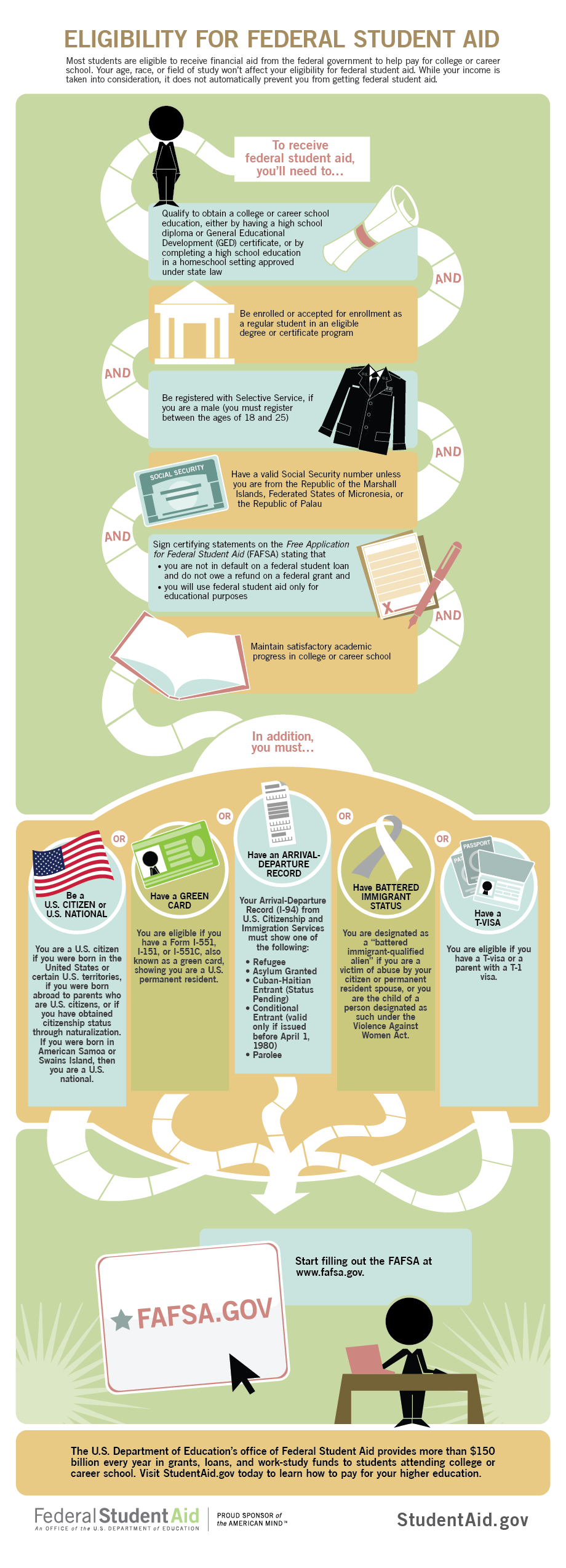Who can apply for FAFSA for 2024-25 award year?
Our basic eligibility requirements are that you must
- demonstrate financial need for need-based federal student aid programs;
- be a U.S. citizen or an eligible noncitizen;
- have a valid Social Security number (with the exception of students from the Republic of the Marshall Islands, Federated States of Micronesia, or the Republic of Palau);
- be enrolled or accepted for enrollment as a regular student in an eligible degree or certificate program;
- maintain satisfactory academic progress in college or career school;
- provide consent and approval to have your federal tax information transferred directly into your 2024–25 Free Application for Federal Student Aid (FAFSA®) form, if you’re applying for aid for July 1, 2024, to June 30, 2025;
- sign the certification statement on the FAFSA form stating that you’re not in default on a federal student loan, you do not owe money on a federal student grant, and you’ll only use federal student aid for educational purposes; and
- show you’re qualified to obtain a college or career school education
Citizenship & Eligible Noncitizen
If you fall in one of the categories below, you are considered an “eligible noncitizen.”
- You are a
- A U.S. national (includes natives of American Samoa or Swains Island),
- U.S. permanent resident (who has an I-151, I-551 or I-551C [Permanent Resident Card]), also known as a “green card.”
- You have an Arrival-Departure Record (I-94) from U.S. Citizen and Immigration Services (USCIS) showing one of the following status categories:*
- Refugee
- Asylum Granted
- Conditional Resident Alien
- Cuban-Haitian Entrant (Status Pending)
- Conditional Entrant (valid only if issued before April 1, 1980)
- Victims of human trafficking, T-visa (T-2, T-3, or T-4, etc.) holder
- Parolee (You must be paroled into the United States for at least one year and you must be able to provide evidence from the USCIS that you are in the United States for other than a temporary purpose and that you intend to become a U.S. citizen or permanent resident.)
Many non-U.S. citizens do not qualify for federal student aid.
If you fall into one of the categories below, you are not eligible for federal student aid.
- F-1, F-2 student visa
- J-1, or J2 exchange visitor visa
- B-1 or B-2 visitor visa
- G series visa (pertaining to international organizations)
- H series or L series visa (allowing temporary employment in the U.S.)
- “Notice of Approval to Apply for Permanent residence” (I-171 or I-464)
- I-94 stamped “ Temporary Protected Status” (TPS)
Satisfactory Academic Progress (SAP)
Federal and state regulations require that students receiving financial aid maintain satisfactory academic progress (SAP) standards toward earning their diploma or certificate in order to maintain their status and/or to be eligible for federally supported financial aid programs. It is a measurement of a student’s successful progress in his/her studies to fulfill the requirements expressed by the Higher Education Act (HEA) of the U.S. Department of Education. All students are measured by qualitative and quantitative standards.
QUALITATIVE AND QUANTITATIVE STANDARDS
Financial aid recipients must meet both a “qualitative” and a “quantitative” standard to maintain eligibility for financial aid. Students must maintain a cumulative 2.0 grade point average (GPA) to meet the qualitative standard.
ATTENDANCE AND EVALUATION
Students must meet the minimum SAP standard to remain in good standing toward their completion of the program. If a student does not meet the standard, he/she will be placed on the status which needs special advices and/or restrictions. Students who fail to attain the SAP can still enroll in the program and receive federal financial aid unless his/her status at Columbia College is terminated.
Any student who needs to miss a class for a medical reason must submit a doctor’s note describing the medical condition. Any student who fails to take a final test will not be able to move to the next level, regardless of his/her attendance rate and level of performance in classroom activities and assignments.
TO KEEP RECEIVING AWARD FUNDS THE STUDENT MUST:
- Maintain a minimum Grade Point Average of C (2.0) at all times
- Complete at least 2/3 of required coursework
- Complete program of study within 150% of published program length for the degree-seeking students, measured in attempted units (For example: a maximum of 90 attempted session units are allowed to complete an Associate or Transfer program of 60 required unit. A student becomes ineligible for further financial aid if they exceed 90 session units.
- Complete program of study within regular published program length if they are an ESL student.
STUDENT RESPONSIBLITIES
NOTE: The SAP Policy for financial aid recipients is different from the College’s satisfactory progress standards maintained by the Counseling Department that places students on academic warning, probation or suspension for failure to achieve a 2.0 grade point average.


